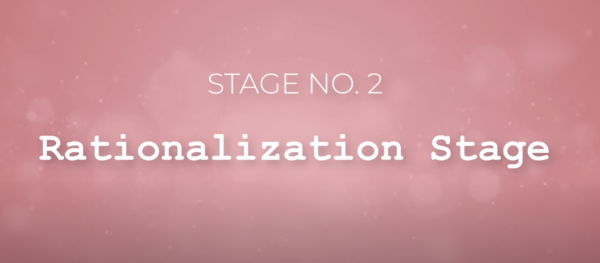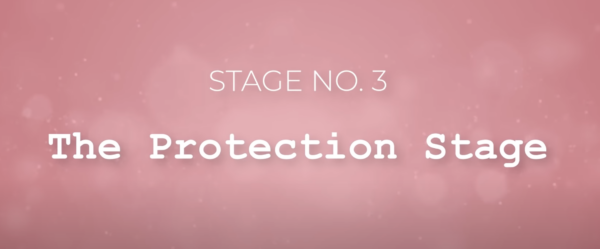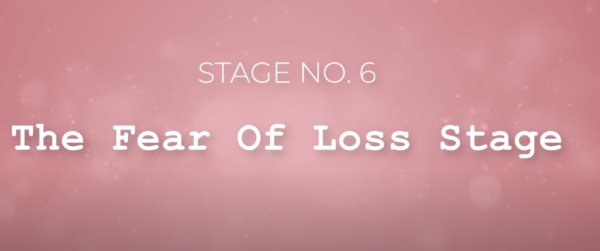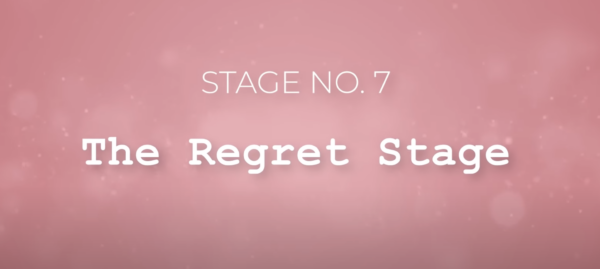Today we’re going to take a hard look at the stages of dumpers remorse.
Firstly, let’s define what dumper’s remorse is.
To put it simply, dumpers remorse can be defined as when your ex breaks up with you and regrets it later down the road. The interesting part is the path that brings them to this eventual regret is filled with many twists and turns.
We’re going to take a close look at each twist and turn. Specifically the seven stages you can expect them to go through.
- Absolutely Certain Stage
- Rationalization Stage
- The Protection Stage
- They’re Gone Forever Stage
- The Nostalgic Reverie Stage
- The Fear Of Loss Stage
- The Regret Stage
Like always, we’ll take insight from real-life success stories.
We’ve been blessed with many success stories that we have personally interviewed about how they won their exes back or got over them.
It’s always interesting to sit down with these people and ask them if their exes had any insight on the stages of the process because that gives you a completely different angle. Let’s narrow down the stages of the dumper’s remorse.
Stage 1: Absolutely Certain Stage
No one likes to admit they’ve made a mistake, especially after the decision, and breakups are no different.
If your ex has dumped you, they are not going to feel dumpers remorse right away. In fact, they are certain about the decision.
We had a recent comment on our private Facebook support group that illustrated this.
Usually, most cases are of women trying to get their ex back who broke up with them.
However, this particular example was a woman who broke up with their boyfriend and tried to get them back.
This particular example also illustrates the dumper’s remorse because the woman at the time of dumping her boyfriend was absolutely certain of her decision.
There were a lot of different factors that led up to this, but the main factor was self-preservation.
She was trying to protect herself from getting hurt, which is usually the same mentality an ex has while breaking up with you.
This happens because they either think they will find someone who meets their needs better or are afraid of getting hurt with too much emotional intimacy.
They become certain that this is the act (breaking up) they need to do to fix whatever they feel inside.
Stage 2: The Rationalization Stage
Part of human instinct is that we tend to be hyper-analytical about our decisions, so no matter how sure or certain we are, there’s a part of us that always wonders if we made the right decision.
This is where the rationalization stage comes into play.

What Are Your Chances of Getting Your Ex Boyfriend Back?
Take the quizYour ex is absolutely certain of their decision to break up with you, but the little doubt creeps up into their mind. In order to slam that down and ensure it doesn’t happen again, they begin to rationalize their decision.
They start thinking about the negative aspects of the relationship. If you used to fight a lot, they would think about major fights and what you said to each other, but more often than not, they will think about how they felt during those moments.
How they felt you were sometimes too much, too insecure, too anxious and how that made them feel empty. They will over-analyze how all this made them feel anxious, and they had to constantly push you away, which didn’t feel good. This makes them rationalize their decision.
Stage 3: The Protection Stage
The protection stage is like stage 2 but on steroids.
To understand this fully, we need to unpack avoidant attachment styles.
Through our YouTube videos, articles, and podcasts, we know that most of our audience has an anxious personality type, and most of their exes have avoidant personality types.
The thing about avoidants is that they want to keep you at bay, and they do not want to permit themselves even to consider getting back to you. As a result of this, they put up an emotional wall.
What does that look like?
They will become even more distant than before. How this usually looks after a breakup if you are not using a no contact rule (which is the predominant case among clients who have just entered out orbit) and talking to your ex is you’ll notice that they are very engaged while talking to you one time.
Another time they are pushing you away and getting distant. You will start picking up certain energy shifts when interacting with them and realize something is bothering them.
Usually, this means that they have entered the ‘Protection Stage’ and put up their emotional wall so they do not get hurt.
This is not about rationalizing their decision or feeling absolutely certain, but it is about the fact that doubt is beginning to creep in. To push those doubts away or to avoid the dumpers’ remorse, they activate their emotional wall.
Stage 4: They’re Gone Forever Stage
This stage tends to happen a little bit later in the process. Usually, the protection stage lasts the longest.
We know this because we’ve dealt with so many clients to quantify how long each stage lasts.
The ‘they’re gone’ stage occurs when enough time has gone by where you actually begin to give up on trying to win them back.
Your ex will pick up on this and start to fully realize that they may have lost you forever.
The no contact rule is a tool that helps you to arrive at this stage.
No contact insinuates the ‘I don’t want you back anymore’ mentality, and there is a bit of a reverse psychology aspect to it which we cannot ignore.
We emphasize that you implement the no contact rule not for the reverse psychology aspect but internal growth.
Nevertheless, one of the advantages of this rule is the ‘I don’t want you back anymore’ reverse psychology aspect.

What Are Your Chances of Getting Your Ex Boyfriend Back?
Take the quizThis is not where exactly the dumper’s remorse starts, but it is certainly where regret starts to properly integrate into the equation.
Stage 5: The Nostalgic Reverie Stage
When their walls start to come down after the no contact rule, they allow themselves permission to have nostalgia or miss you.
One of people’s biggest misconceptions about avoidant exes is that they push you away and want you to stay away forever.
This is not true because they only want you to stay away till they feel safe enough to miss you, and they only feel safe to miss you when they feel like you’re gone forever or moved on.
Typically speaking, this is when nostalgia occurs.
They will permit themselves to miss you.
They will think of the good times with you instead of the negative times they were thinking about before.
They will focus on the nostalgic elements.
Nostalgia is a very interesting component, and sometimes this stage doesn’t happen till very long down the lane.
Consider that you did everything wrong after the breakup.
At some point of doing the wrong things 5-6 months down the lane, you decide that you are going to give up on your ex.
You decide that you want to move on, which is the healthy thing to do, and then the interesting thing happens. Just as you were about to start moving on, you heard that your ex is interested in talking to you again.
You begin to wonder if you still feel the same way about them when you wanted them back, so you explore that feeling and talk further. This is the nostalgic reverie stage.
Stage 6: The Fear of Loss Stage
Let’s continue with the previous example—your ex, who broke up with you, contacts you after a year because of the nostalgic reverie stage.
However, things are different after a year, and maybe you’re beginning to date someone else, and they did not know about this fact. When they find out about this fact is when the fear of loss gets triggered.
This is when they go to themselves, ‘Oh My God, what have I done. I might have made a mistake.’. It’s not the full-on dumpers remorse just yet, but they begin to realize they’re about to miss out on something.
An interesting philosophical debate can happen here. Are they bothered that they miss you, or is it because you have moved on to someone else?
We’re inclined to believe that it is a bit of both. This is because good memories and nostalgia need to be there for your ex to want to reach out to you, which, coupled with them finding out about your new romantic interest, incites an incentive to want you back.
This is typically the stage where a lot of success stories take the initiative. Fear of loss is a powerful factor in forcing your ex to act.

What Are Your Chances of Getting Your Ex Boyfriend Back?
Take the quizStage 7: The Regret Stage
Some people during the fear of loss stage will immediately ask for you back or make an attempt.
Others simply won’t.
The people who won’t attempt end up having massive regrets.
This is an undervalued factor of the entire process because the natural assumption is that if someone regrets breaking up with you/experiencing dumpers remorse, they will act.
This is not true.
We can double-check this by looking at a general example.
How many people die with regrets?
Regrets of missed opportunities, things they wish they did. The answer is that many people do not act on their regrets.
This is the big flaw with dumpers remorse.
Your ex can have dumpers remorse after a breakup but will be too afraid to act.
This is what we tell our clients who are afraid to act because it is not socially acceptable.
Sometimes you have to take the first step; otherwise, both of you will live with regrets.
Today, you might regret not trying to see how things would go about, and your ex would feel the same, and at the end of it, the two parties don’t want to converse when they both want each other back. Nothing happens, and both parties live in regret.
An important concept of the dumpers remorse is: don’t assume just because an ex has dumpers remorse that’s going to be enough for them to act to try to get you back.
Moreover, do not also assume that it will be enough for them to want you back.
Sometimes, an ex will just want that bout of nostalgia.
This can be exemplified by the scenario when you really want to revisit a childhood movie or a video game.
You might feel really nostalgic about it, but once you acquire that videogame again and play it for a bit, you will feel really good but only for that while. You enjoy that video game for a little while, but then you get your fix and quit for the next few years.
The same can be applied to an ex when they want to talk to you for a bit and want you back, but as soon as they get their fix, they’re over you.
This is the flaw with dumpers remorse. You need to ensure that you’ve achieved external and internal growth, which is pivotal to keep them once they come back.
Conclusion
Dumper’s remorse is an important concept to understand if you need to comprehend dumpers psychology.
It is a concept that explains many things to you if you have been broken up with and are confused by your ex’s behavior.
The dumper needs to go through a few extensive stages that have deep emotional impacts and changes to reach dumpers remorse. Let’s quickly recap these stages:
- Stage 1: Absolutely Certain Stage: The stage when your ex is absolutely sure of their decision to break up with you, and they feel confident.
- Stage 2: The Rationalization Stage: This is the stage where they start to rationalize their decision by focusing on the elements and reasons that brought them to the decision to break up with you. This can include thinking about bad traits, fights, differences, and a lot more.
- Stage 3: The Protection Stage: In this stage, doubt starts to creep in, so your ex will start putting up an emotional wall to feel free from their doubt and feel secure with their decision.
- Stage 4: They’re Gone Forever: During this stage, regret starts to form a little more strongly in the ex’s mind after you have initiated a no contact rule and make no efforts to contact them. This makes your ex think that you really are ‘gone forever.’
- Stage 5: The Nostalgic Reverie Stage: At this stage, your avoidant ex starts to think of the nostalgic elements of the relationship and things that made them feel good. They finally allow themselves to miss you and eventually reach out to you.
- Stage 6: The Fear of Loss Stage: This usually happens after your ex reaches out to you and finds out that you are seeing someone else. Their fear of loss gets triggered, and they realize that you really are moving on.
- Stage 7: The Regret Stage: 50% of people will act on their desire to get you back after the fear of loss stage, while 50% will not act on this. The 50% who do not act on this impulse end up with major regret. This flaw with the dumper’s remorse is that many people do not act to fix their regrets. Hence it ends up with two people who want each other but not communicating with each other.
We hope this piece helps you understand the psychology of a dumper better and basically understand the various stages they go through after a breakup.






